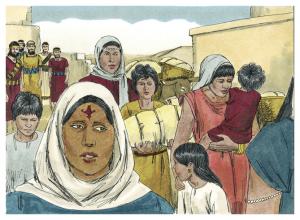
This series started with a story of human sacrifice that masquerades as a punishment for a crime. In the Bible there are stories of explicitly religious human sacrifice that indicate that the practice may once have been accepted in early Israelite religion. Abraham’s near sacrifice of his son Isaac is one such story. What can it tell us about how Jesus understood his death?
Episode 4 in Opening the Scriptures on the Way to Emmaus: Why Messiah had to Suffer. Introduction and links to other posts in the series here.
If we focus on Abraham, we see a man of great faith. He comes off pretty well, unless you’re Sarah. She gave birth to Isaac in her extreme old age. Now she’s wondering why her doddering husband is listening to voices from the sky ordering him to kill her only child.
The god character doesn’t come off so well. He seems insecure. Does Abraham like some other god or Isaac better? God has to find out.
Does God want Isaac as a human sacrifice?
Some interpreters are troubled by the idea of God ordering Isaac’s death, or even pretending to. They say the story is a lesson, but not about a faith so strong that it is willing to make a human sacrifice. Since Isaac doesn’t die at the end, the story means God doesn’t want human sacrifice. That’s a bold move, especially since Paul in the New Testament thinks very differently. Still I think there is a lesson about human sacrifice in the story.
A previous post questions the historicity of the story and also suggests that the story may have had a make-over before getting into the Bible. In a hypothetical original version Abraham actually sacrifices his son. In the version that we have God prevents him. The message that God doesn’t approve of human sacrifice comes across even more strongly to hearers who knew the original story. Then the changes to the story would be what the editor had in mind to teach—and not a questionable historical fact about people named Abraham and Isaac and an unfathomable command from God.
Jesus in the story
In this series I’m making guesses about which stories Jesus would tell and interpret on the way to Emmaus. They would be stories where Jesus can find himself, especially his death. The stories should tell us something about Jesus’ decision to accept death on a cross.
A human child is willing to be a sacrifice in obedience to a voice and an arbitrary command. Isaac’s obedience is like that of Jesus, but not entirely. The story doesn’t exactly approve of Isaac’s motivation. Besides, we have no record of God telling Jesus what to do. The ram, which gave its life in place of another, is more like Jesus than Isaac. If this is a story that Jesus interprets on the way to Emmaus, it tells us at least this much: Jesus was not fulfilling some arbitrary requirement. He must have had his own thoughts about why the cross was necessary.
Looking ahead
The story tells us that God doesn’t want human sacrifice, but we can’t avoid the impression that God desires an offering of something. The custom of offering sacrifices to God is a prominent feature of the Old Testament often unrelated to any wrongs committed.
The Original Sin story suggests that God could make a sacrifice on behalf of the humans. He offers up some animals to dress them. What sense does it make for humans to offer sacrifice to God? Does God require repayment for benefits given or offenses taken? What kind of giver would a God who required repayment be? What kind of father would God be if God can’t forgive without exacting some penalty.
Sacrifice is so central a part of biblical and most other religions that it’s going to need some more thought. The next story considers whether a sacrifice to God is a kind of repayment and also what can go wrong with sacrifices.












